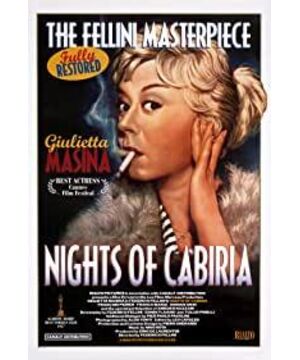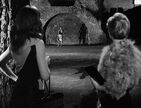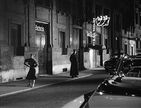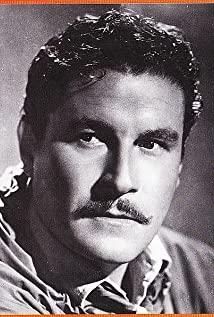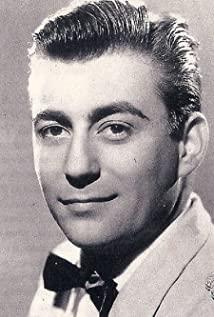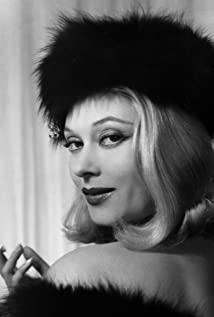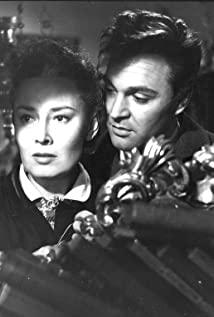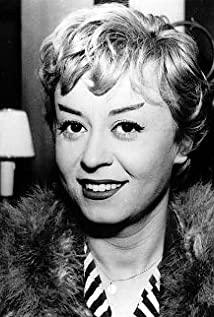The movie begins with a chase in a field. In the long-range picture, a well-dressed couple is running in a field with bright sunshine. This lighthearted picture often appears in romance movies and novels. But as they run together by the river, the camera cuts to a close-up, the man in the sunglasses glances behind him, and then the camera switches back to the long-range, and we just realize we're witnessing a murder: the man pushes the woman into the water , snatched the package and fled. The camera is aimed at the drowning woman again, and her struggle is getting weaker and weaker; in the woman's cry for help, the man runs farther and farther. Immediately afterwards, the camera began to describe the rescue operations of the villagers who heard the cries for help. Then the camera kept switching to different villagers, and the atmosphere became tense. This series of clean and neat shots can't help but remind people of the shooting of the news scene, which forms a sharp contrast with the relaxed, romantic, and common long-range images in the opening, which inevitably makes people suspect that the director is shattering the romantic fantasy of the public.
The woman was then rescued by a group of shirtless peasants, who woke up with no gratitude towards them and hurried away from them. Look around for the man she calls Giorgio. It is not difficult to notice that the woman's indescribably elegant demeanor is not in harmony with her bright clothes. At this time, a passing child reveals the woman's identity at the right time: she is Kabylia of the village.
When Kabylia returns home, a woman named Wanda by Kabylia appears. In the medium shot, Wanda can be clearly noticed wearing extremely high heels in the rough field and twisting her foot from walking faster. This incongruity hints at the ubiquitous element of vanity in the film. At Kabylia's house, Wanda comforted Kabylia, but Kabylia felt that she was too loud, and irritably asked Wanda to leave and asked Wanda to stop borrowing her thermometer.
From Wanda's out-of-door conversation with Kabylia, we learn that Kabylia and the man who pushed her into the river have only known each other for a month, and that he doesn't know where he lives. When Kabylia asked why someone would kill for 15,000 lire, Wanda threw a sentence that people would kill for 5,000 lire. In a light-hearted soundtrack, Kabylia realizes that she could have died, and takes a chicken out of its cage and strokes it lightly. A minute later, Kabylia suddenly raised her head and threw the chicken away without warning, walked into the house, and prepared to burn the clothes she had given to the man. Although she said angrily that there is no such thing as a banquet in the world, the firelight illuminated her sad face.
So far, we have basically completed the construction of the image of Kabylia. She lives in the countryside, but she dresses up in style, imitating the clothes of the Romans, and chasing material pleasures; but on the other hand, Kabylia is poor, she The neighbors don't even have a thermometer. In addition, despite being poor, Cabiria bought many fine clothes for Giorgio. When she got home, she was very sad because her boyfriend pushed her into the water for 15,000 lire. Kabylia's yearning for love and innocence are vividly displayed.
The camera turns to a close-up of a woman's feet in high heels. In Freud's theory, feet and sex are closely related, and high heels are in a way one of the masterpieces of materialism, so we set out to explore the other side of Kabylia. Cut to medium shot, we see a bumpy woman muttering to her own shadow, but her heels are not the ones seen before. The previous high-heeled shoes reappear, this time panning up from the shoes to the body of another woman, turning to an elevation shot. The woman talking to herself stands on the other side of the street. The camera follows the woman in high heels and turns to the other side. In the picture, a group of people chats around a bright car parked on the side of the road. From their words, we know that the car belongs to a well-dressed woman. The camera follows the tricycle driving on the road. The shot cuts to the woman talking to herself, then to Kabylia getting off the tricycle. As Kabylia started praising the saloon, the woman talking to herself suddenly shouted from across: "I know how she got that saloon." The well-dressed woman was incensed. The strong rhythm of the music suddenly sounded, and Kabylia suddenly began to dance. A man saw this scene and danced with Kabylia. A car passes by, the woman talking to herself fails to pick up the passenger, Cabiria mocks her for being too old, and she mentions Giorgio, successfully angering Cabiria, and the two start a fight. The people watching the lively around kept applauding, and others carried Kabylia into the car. Aging is the biggest fear of people like Kabylia, and love is Kabylia's deep desire.
Kabylia had nowhere to go at night in Rome alone. When she heard music coming from the house and saw no one around, she danced by herself again, forgetting all kinds of anxiety. Then, she accidentally saw the handsome movie star Alberto quarreling with his girlfriend Jessy, slapped Jessy, and Jessy left in frustration. Alberto saw Kabylia alone in the street and invited her to his car.
Kabylia fell into a joyous embarrassment. She wobbled and wobbled in the car; Alberto invited her into the restaurant, fearful of being pulled over to the doorman to say loudly that she was invited; she was trapped by the thick curtains of the restaurant. Alberto poured himself a drink and didn't communicate much with Kabylia. In the restaurant he turned down another beautiful woman's invitation and asked Kabylia to dance instead. Kabylia was so excited that she danced an overly active dance. This kind of plot is very common in today's Mary Sue film and television dramas. However, unlike the love at first sight and careful care of the heroine for the heroine in those movies and TV dramas, there has always been a sense of distance between Kabylia and Alberto.
Alberto takes Cabiria home. Kabylia marveled at the luxury of his home. In the elevation shot, she jumped up the long stairs excitedly alone. Alberto played Beethoven's music, and the communication between the two gradually increased, and Kabylia showed off that unlike other people who slept in the bridge hole, she had a house, water, electricity, gas and a thermometer. The butler brought a cart of food and wine, and Alberto and Cabiria drank together, further deepening the romantic atmosphere. Cabiria, joking, asked Alberto for an autograph, thinking about how to show off her experience to her friends. So far, so good and dreamy: the deceived Kabylia gets the favor of movie stars. However, Alberto's girlfriend arrives, and Alberto doesn't hesitate to lock Kabylia in the bathroom. Kabylia saw the two kissing from the crack of the door. She was now an extra person in the room. She saw a dog in the room and picked it up. The next day, Alberto tiptoed out of the room with Kabylia, and she saw Jessy on the bed. A corresponding down-angle shot shows Cabiria tiptoeing down the stairs. Kabylia walked through the garden alone again and returned to his quarters.
On the same street on a rainy night, others mocked Kabylia for making up stories about being with Alberto. At this point, the dissolution of the Cinderella stories that are common in some movies and fall in love has come to an end.
After seeing Alberto's museum-like homes and lavish lifestyles, Kabylia experienced a cave adventure. Correspondingly, the film sounded the music full of sympathy. She meets a philanthropist who delivers food to the homeless. The panoramic shot shows the houses of the Roman city lined up not far away, and on the side of the cave is a forgotten world. In caves covered in weeds lived old, sickly poor people. Kabylia meets an old woman she once knew, who reminisces about the wealth she once used, and Kabylia implies that a man caused her downfall. While talking to Kabylia, the woman took out a comb and combed her hair. The woman's similar experiences with Kabylia have raised concerns about whether Kabylia has a future like hers. Love and aging are the worst enemies of the people of Kabylia. The philanthropist takes Kabylia home, and in the car we learn for the first time Kabylia's real name: Maria. Kabylia confided the misfortune of her life to a stranger: her parents died early, and she went to Rome alone to make a living. The existence of philanthropists leaves a glimmer of hope for this grim film. There is no love between Kabylia and the philanthropist, but the two have mutual affection, which roughly stems from the kindness in their hearts.
Kabylia's last love takes place at the end of the credits. She expresses her longing for a good love and marriage under the hypnosis of a magician. The audience below laughed at her. She waited for the others to leave before she dared to leave the theatre, but she was approached by a man in a suit, who claimed to be Oscar, and was moved by her innocence. "We can all pretend to be cynical or scheming, but when confronted with purity and innocence, the mask of hypocrisy comes off and there is something beautiful in our hearts," he told Kabylia. Almost moved by him, he reassures Kabylia that some things are not tainted by vulgar society, and that there is always someone who can understand her. He invited Kabylia on a date, took her to eat at different restaurants, and offered to pay for it. Not only that, he also talked to Kabylia about his loneliness, difficulty and struggle as an orphan. In the end, Kabylia was fascinated by his gentlemanly demeanor and literary conversation. Oscar plays the heroic role of saving beauty in other movies in a different way. On another corresponding night, Kabylia turned away her customers.
When Oscar proposed to marry him and said that he didn't care about Kabylia's past and just wanted to know her heart, she was completely moved, readily agreed to the proposal, and decided to sell the house and this man who had known him for less than a month and didn't know where he lived. live together. After Kabylia sold the house, he took the money and dined with Oscar in an elegant and casual place. Kabylia appears to be entering middle-class life. After dinner, Oscar took her for a walk, and the two walked through the woods to the edge of the cliff. Kabylia talked about what happened to him when he was pushed into the river before, but found that Oscar's expression was wrong. He suddenly realized that he also wanted to make money and kill himself. He left his wallet on Oscar and knelt on the ground and cried. In desperation, Kabylia tries to jump off a cliff. Oscar hurriedly stopped her, pushed her to the ground, picked up her wallet and ran away. At this time, the scene of Kabylia kneeling and crying in the sunset breeze is very similar to the last scene of the tragedy. Surprisingly, the movie didn't end here. Kabylia lay on the ground and cried. After her tears ran out, she picked up the flowers she picked in the woods, left the cliff, walked through the woods, and came to the road. On the road happened to pass a group of people celebrating the newlyweds. They rode bicycles, played guitar and sang pop music, symbolizing a new generation of young people.
Kabylia swirls from dream reality to reality, and at the end of the film, she walks quietly to the song of the wedding, the dream experience frozen into a black tear and a silent smile. Her tears are all the tragedy, and her smile transcends the tragedy and becomes a dream again.
View more about Nights of Cabiria reviews


